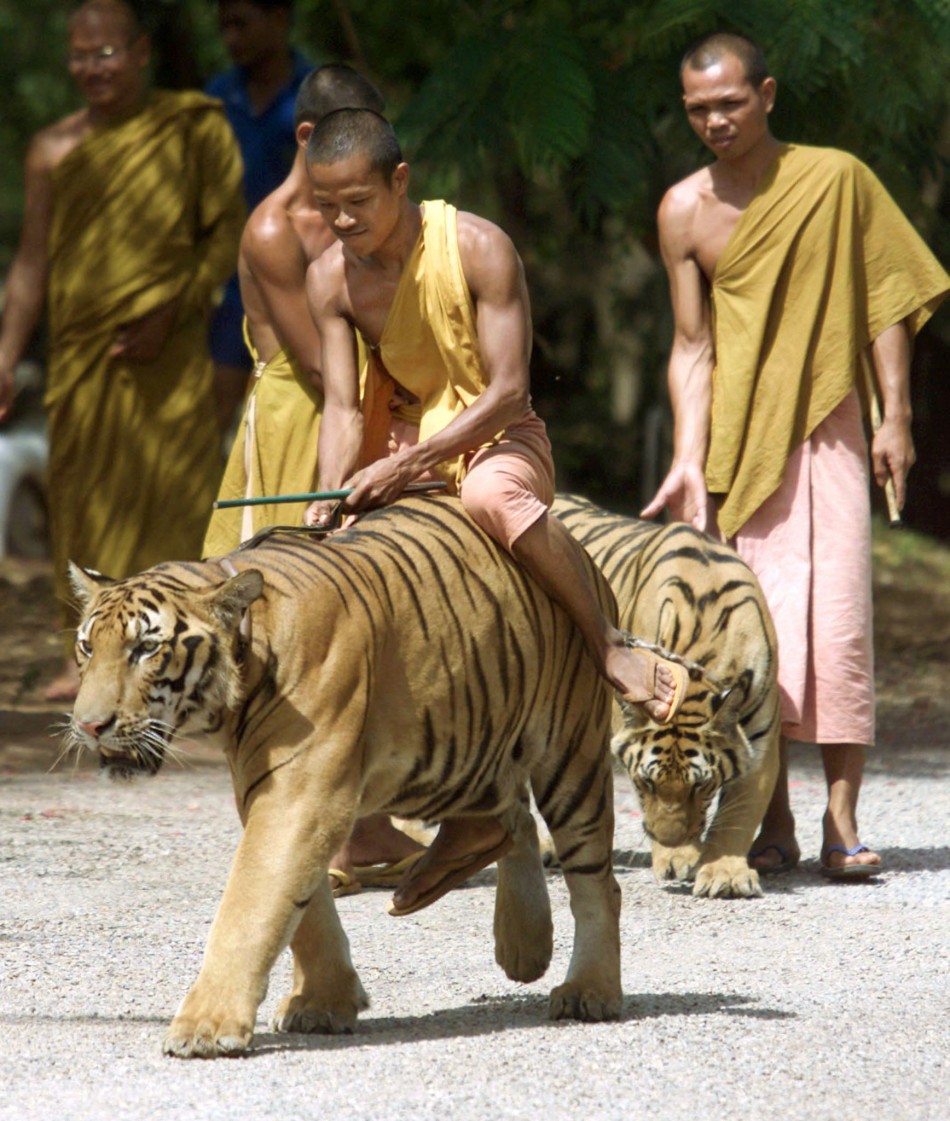'Tiger Temple' in Thailand is Growing Tourism Hot Spot: Where Wild Stays with the Monks [PHOTOS]
A UK-based wildlife conservation group - Care for the Wild International (CWI) - prepared a report in 2008, pointing out the temple was involved in the illegal trade of tigers and was associated with a tiger farm in Laos.
Wat Pha Luang Ta Bua, popularly known as the "Tiger Temple", in western Thailand is a growing tourist hot spot. You see... it is one of only few places in the world where the average man or woman can actually touch and play with adult tigers. The people behind this seemingly remarkable opportunity are the temple monks of the monastery which was founded in 1994.
Buddhist temples, and indeed the religion itself, have a well-deserved reputation for respecting the sanctity of all living things and their right to that life. Most temples of this sort do wind up caring for large numbers of cats and dogs... tigers, however, are new.
The temple is located in the Saiyok district of Thailand's Kanchanaburi province (which lies west of the capital city of Bangkok) and the monks received their first tiger cub in 1999, when local villagers rescued an orphaned cub.
The monks had initially hoped to build a natural preserve for the endangered species at their temple. However, over the last decade, such has been the force de majeure, in some respects, of time that now the temple itself has grown to represent a sanctuary and in the process devolved as a leading tourist destination.
However, the temple has come in for repeated and severe criticism from a number of animal welfare groups, for allegedly allowing the illegal trade of tigers and tiger parts. In addition, there have also been reports of the physical exploitation and abuse of these animals. Finally, although the temple appears to take all the necessary steps to ensure the safety of its visitors, it has been widely condemned for putting the tourists at risk by allowing them to get close to the tigers.
A UK-based wildlife conservation group - Care for the Wild International (CWI) - prepared a report in 2008, pointing out that because the tigers at the temple were DNA-tested, the temple could not be allowed to participate in recognised breeding programmes.
"Breeding tigers requires a Government licence under the Thai Wild Animals Reservation and Protection Act 1992. The Temple does not have such a licence but has, by its own records, bred at least 10 cubs from its original animals. A number of other cubs were born, but did not survive," CWI said in the report.
The organisation also said the temple was involved in the illegal trade of tigers and was associated with a tiger farm in Laos.
"Exchange or sale of tigers across international borders is prohibited under international and Thai law. But CWI uncovered that at least seven tigers have disappeared from the Temple between 2005 and 2007, and at least five individuals appeared without explanation," the report alleged.
A number of other concerned wildlife conservation groups have repeatedly spoken out against the dangers of allowing visitors to be in such close proximity to animals that are, at heart, carnivorous and more than capable of killing a human being without the slightest compunction or difficulty. Unfortunately, for most unsuspecting visitors, the pseudo-colonial lure of being photographed with a tiger at one's feet often proves too strong to resist.
Check out some recent photos from the Tiger Temple in Thailand, while you decide if this is a good or a bad thing
MUST READ: Africa Witnesses Worst Poaching in DR Congo: 22 Elephants Massacred in Helicopter Attack [PHOTOS]









© Copyright IBTimes 2024. All rights reserved.






